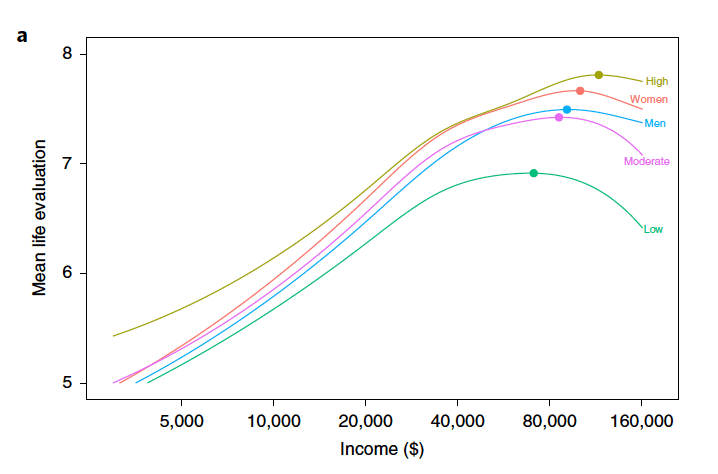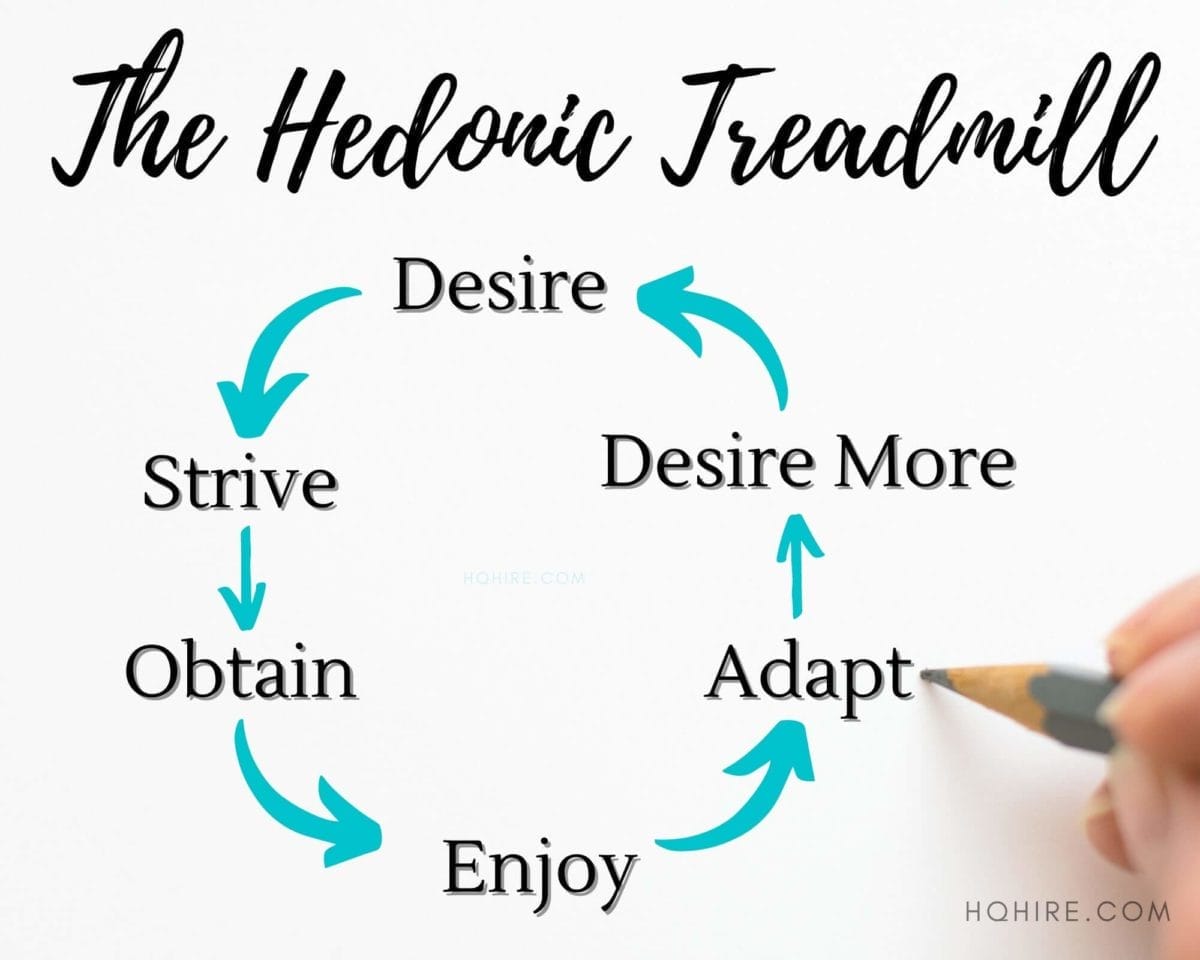According to a study on the topic of “money vs happiness” with over 1.7 million individuals worldwide on human behavior. While Money can buy you happiness, the researchers from Gallup World Poll found that higher pay doesn’t always correlate to a higher level of happiness.
In fact, the study found that you can be working in a lower-paying job but happier.

More Money ≠ Happiness
A quick check on the career database shows that most careers and occupations earn an average of $50,699 per annual, but the salary range varies greatly between the industries (Average of $30,000 to $104,000).
Correlation Between Money and Happiness
People are happier when they make more money as their emotional well-being rose with income, but only up until a point where the correlation gradually becomes less significant, and eventually, the correlation (r) of income to happiness becomes zero.

At lower income group, if you are earning $10,000 today and got a pay raise to $20,000 annual income up to $40,000 annual income, it shows a significant increase in your happiness and life satisfaction level.
The correlation of your happiness and life satisfaction level with your annual income remains steady till you’ve reached an annual income of $60,000.
But you’ll notice, as your earnings increase higher, the level of happiness doesn’t increase just as much as your annual income reached the critical point of $40,000.
An increase in annual income correlates with your happiness and life satisfaction level but to a certain extent.
The increase in your annual income after the critical income level will lead to a plateau or even a decrease in your happiness and life satisfaction level.
This is illustrated by the graph whereas your annual income reaches $60,000, your happiness level will start to plateau, or even fall.
Perfect Salary for Maximum Happiness in The United States
People are happier when they make more money, Americans with a salary earning more than $95,000 annually are the happiest according to a study by Purdue University.
The study found that a $95,000 annual income is the ideal income for life evaluation where you’ll not only have enough wealth to meet basic needs.
You’ll have a fulfilling life that meets the higher level of Maslow’s Hierarchy of Needs.
| Level | Maslow’ Hierarchy | Description |
|---|---|---|
| 1 | Physiological Needs | Basic needs: Food, water, clothing, and shelter. |
| 2 | Safety Needs | Basic needs: Protection from violence and general well-being. |
| 3 | Love and Belonging Needs | Physical and emotional intimacy, ranging from emotional bonds to sexual relationships. |
| 4 | Esteem Needs | Self-confidence and acknowledgment from others. |
| 5 | Self-actualization Needs | Fulfillment of one’s potential as a person. |
The study shows, that a $95,000 annual income allows an individual to reach the highest level of happiness in wealthier countries like America, the United Kingdom, Canada, Singapore, and Japan.
In the United States, the average annual salary of an employee can range from $40,000 to $90,000.
But less wealthy countries earn less to reach peak happiness.
Globally, people who are earning $60,000 to $75,000 per year show the highest level of emotional well-being.
Why More Money Doesn’t Make You Happier?
Earning more money doesn’t make you happier because the things that bring long-term satisfaction and contentment cannot be bought.
In fact, earning more than $95,000 is associated with a lower level of happiness.
Why?
Different research has come up with a few different theories of why more money doesn’t always make you happier.
The main reason why too much money is a bad thing is that,
“Money influences happiness through the fulfilment of both needs and increasing material desires.”
This is a psychological phenomenon called “hedonic adaptation”.
What is a hedonic treadmill?
A hedonic treadmill is a term used to describe the human tendency to pursue pleasure one after another. Hedonic treadmill describes the effect of the return of your emotions to your baseline level after the surge of happiness felt after a positive turn of events.

Over time, we get used to that change in our lives, and our expectations change, and eventually our lifestyle changes as well.
When we reach the satiation point of $95,000 annual income per year, the desire to fulfill material desires increases exponentially. Thus, lower level of happiness.
Does Money Bring Happiness?
Money does improve happiness and having the right amount of money can leave you feeling less stressed and generally more satisfied with life by providing for your general needs and wants.
According to the studies, the perfect salary for happiness is $75,000, which sits just around the middle of $60,000 and $95,000.
But depending on where you live in the world,
“Income of $60,000 to $95,000 will make you quite a happy individual according to science.”
Yes, money can buy happiness.
What Are The Happiest Jobs That Pay Well?
Finding a job that you will like is quite tough, especially when you are trying to find one that you will find enjoyment working while making you a good living.
Here are some of the happiest jobs with good pay according to recent studies.
| No. | Job Title | Median Salary | Education Requirement |
|---|---|---|---|
| 1 | Property manager | $51,229 | Associate degree |
| 2 | Plumber | $51,776 | None |
| 3 | Carpenter | $53,862 | None |
| 4 | Interior designer | $57,369 | Postsecondary certificates |
| 5 | Marketing consultant | $59,493 | Associate degree |
| 6 | Facilities manager | $62,769 | Associate degree |
| 7 | Executive chef | $63,325 | Postsecondary certificates |
| 8 | HR manager | $69,221 | Associate degree |
| 9 | Aircraft mechanic | $69,472 | Postsecondary certificates |
| 10 | Surgical technologist | $69,725 | Associate degree |
| 11 | Physical therapist assistant | $70,904 | Associate degree |
| 12 | IT consultant | $75,883 | Associate degree |
| 13 | Accounting manager | $77,979 | Associate degree |
| 14 | Dental hygienist | $78,974 | Associate degree |
| 15 | Real estate agent | $90,687 | Postsecondary certificates |
| 16 | .NET developer | $95,312 | Associate degree |
| 17 | Finance manager | $97,916 | Associate degree |
| 18 | Network engineer | $98,068 | Associate degree |
| 19 | Software engineer | $108,981 | Associate degree |
| 20 | Chief technology officer | $144,682 | Associate degree |
| 21 | Loan officer | $176,466 | Associate degree |
Join over 11,000+ achievers who are committed to achieving their career goals!






